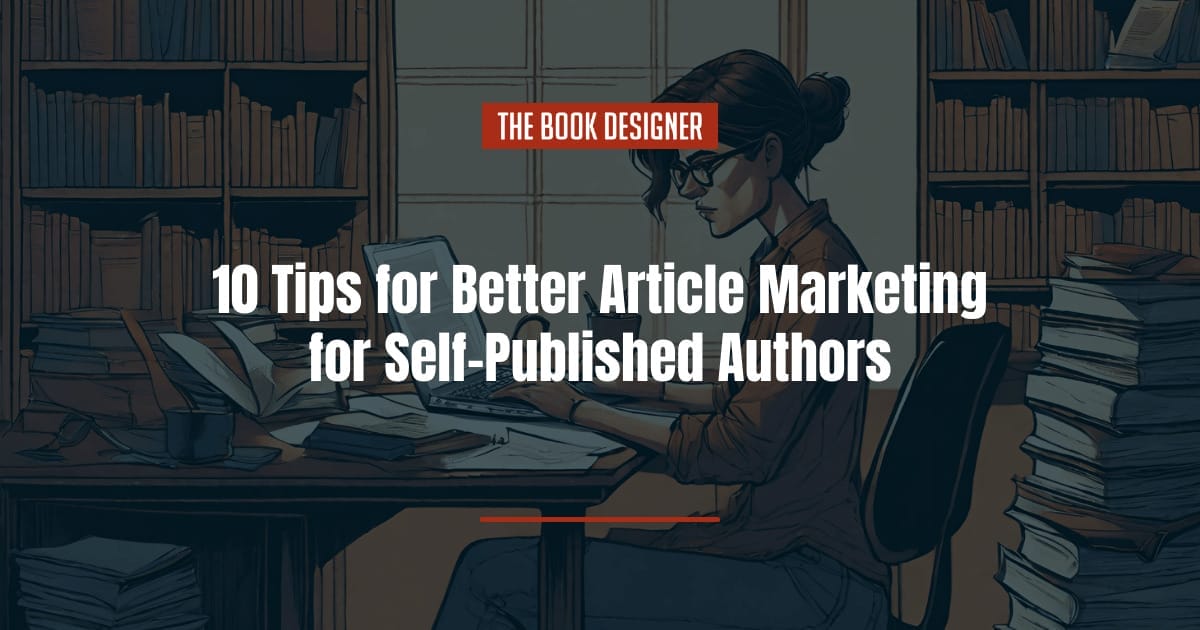Article marketing—writing articles for the express purpose of building an audience and generating sales on sites other than your own—is a tried-and-true way to get the word out about a variety of products and services, including self-published books. It’s a low-cost, though sometimes time-consuming, method of getting more readers and establishing your expertise as an author.
So how does a self-published author get started with article marketing? Where should an author write and publish articles for the best results? And how does social media fit into article marketing strategies?
Here’s what self-published authors need to know about article marketing:
1. Showcase Your Expertise with Article Marketing
Showcasing your expertise is an excellent way to use article marketing as a self-published author. You may be thinking that this is only for those who write non-fiction, but there are plenty of opportunities for fiction authors to use article marketing in this way, too.
On the nonfiction side, write about topics related to your books. For example, if you’re a self-help writer, writing about ways to set goals, improve your life, establish boundaries, or the like are an excellent way to show readers of both the articles and your books that you know what you’re talking about.
On the fiction side of things, consider topics related to your genre and to your books in particular. For instance, if you’ve written a historical novel, you could write articles about the historical period you’ve covered. Even with a genre like fantasy, there’s potential for article marketing. You could write about mythology, for example, and how it has influenced the modern fantasy genre.
2. Expand Your Audience
Expecting readers to find your books only through channels like bookstores or review websites is kind of life expecting them to find a specific needle in a haystack filled with needles.
By writing articles on a variety of platforms (blogs, magazines, websites like Medium, etc.), authors can reach a broader audience and bring awareness to their books. Even sites like LinkedIn can be an excellent marketing tool for authors, particularly those writing nonfiction.
Reach out to bloggers who are covering topics you think your readers might be interested in and ask about guest blogging opportunities. These sites are often looking for additional content and usually allow authors to include a link to their books in their byline, if not elsewhere in their articles.
3. SEO and Online Presence
Learning some basic SEO principles and techniques can help expand your article marketing reach even further. The best part about using SEO is that your content gets in front of people who are specifically looking for that content.
Basic SEO can be learned pretty quickly. It includes things like finding the best keywords or keyword phrases to use in your article, knowing how and where to incorporate those keywords, and creating content that’s more useful than the existing content for those keywords. (There’s more to SEO than that, but those are good starting points for writers who aren’t interested in becoming SEO experts.)
By writing for websites that already have content that ranks well in search engine results, you increase the chances that your content will also rank well.
Linking back to your own website can also help your site rank higher in search engine results. Backlinks from sites that have high authority convey some of that authority to your website, telling search engines that it’s more trustworthy and includes quality content.
4. Build a Mailing List Through Article Marketing
Building an email list is one of the best things an author can do to build a fan base and consistent sales for their books. Email lists are more valuable than many other types of marketing since these are people who have specifically said they want to hear from you. And for the most part, you don’t have to worry about your content getting buried because of algorithm shifts like you do on social media.
Including a newsletter signup link in every article you write is a great way to slowly build up your email list with people who want to hear what you have to say. From there, send out regular updates to your list and be sure to include information about new book launches.
To increase the number of people who sign up for your list, you can offer something of value in exchange, like a free chapter of one of your books or other exclusive content.
5. Engage with Communities
There are online communities out there for virtually every topic, niche, or interest. Engaging with them can be an amazing way to build an audience and sell more books. Look for websites that have active user communities, whether in their comments section or a dedicated forum. Check out groups on Facebook or LinkedIn and see if any of them publish longer-form content or allow for links to useful articles.
Consider how you can provide new information or a new perspective to these communities through your articles. Your goal should always be to provide value and useful information first, and your audience will grow organically through doing that.
6. Create a Narrative Around Your Book
You can use articles to tell the story behind your book, share your writing journey, and connect on a personal level with your readers. After all, readers love to connect with their favorite authors. Even super famous best-selling authors regularly engage with their fans online, either directly on social media or through articles (or both).
Consider the ways you could write about your writing process. You could let readers know about how you create characters, how you outline or plot your books, how you get ideas in general, or how you conduct research. Make it personal and keep it interesting and you’re sure to create stronger connections with readers.
7. Link Back to Your Book
This one is simple: Always include a call to action in your articles. This could be a link to where your book can be purchased, your website, or your author page. Make it easy for readers to find and buy your book.
Some platforms won’t allow you to include self-promotional links in the body of your articles, but virtually all of them allow you to include links in your byline or author bio. Include links to your social media accounts, too, if possible.
8. Leverage Social Media to Boost Your Article Marketing
Share your articles on social media platforms. This not only increases the reach of your articles but also drives engagement with your author social media profiles, leading to a larger following.
Effective social media can also help articles go viral (yep, that’s still a thing that happens), which can drive even more traffic, engagement, and potential readers to your writing. Be sure to reach out to anyone you mention in your articles, too, to ask them to share on their own social media accounts.
9. Collaborate with Other Authors
Exchange guest posts with other authors or collaborate on articles. This exposes your work to their audience, and vice versa, fostering a sense of community and mutual support.
In a lot of industries, it might seem like collaborating with your “competition” is a bad idea, but the same is rarely true in the publishing world. After all, readers don’t have “brand loyalty” in the same way that consumers have loyalty in other products. Readers usually have their favorite authors they’ll buy every new release from, but they also read books from other authors regularly and are often willing to try something new.
10. Measure and Adapt
Article marketing is more useful if you track how your articles do and then adapt based on that data. Pay attention to which articles receive the most engagement and feedback. Then use that data to decide which topics and platforms are most worthwhile.
If you’re writing for someone else’s website or blog, it’s a good idea to ask them a couple of weeks after your article is published what the traffic numbers for the article were. You can also search for backlinks to the article both on other websites and on social media. This will give you some idea of how much traction your article got. And if you linked to your own website in the article, you should be able to see the traffic referred to your site through that link in your analytics program. All of these numbers are important for figuring out which articles worked best for you.
How to Make Your Articles Stand Out
Whenever you’re creating content for article marketing or other purposes, remember that you want to be the author of articles that stand out. And they will if you see to it that:
- Your article is relevant to the needs of people who are searching for information on your area.
- Your article is based on your own real-world experience.
- Your article contains information that can be put into action to help solve the problem that caused the search in the first place.
Article marketing is marketing that any author can do with a small investment of time, and at no cost. It can help self-publishers grow their audience, reinforce their expertise, and, ultimately, sell more books.
Editor’s note: This article is based on a series originally written by Joel Friedlander and has been updated and revised by The Book Designer editorial team.




